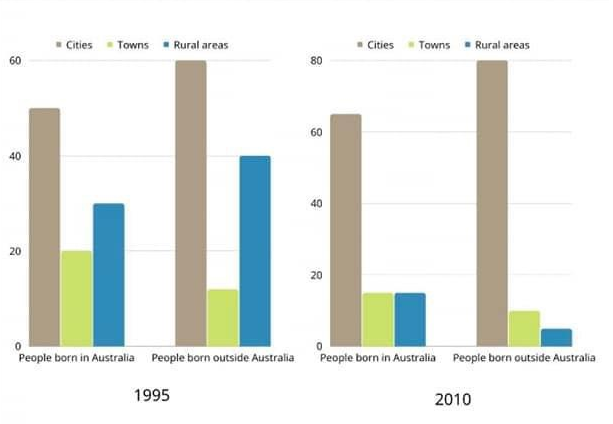[Kishan P] Writing Practice Test 1215824
Task 1
You should spend about 20 minutes on this task.
The bar chart below describes some changes about the percentage of people were born in Australia and who were born outside Australia living in urban, rural and town between 1995 and 2010.
Summarise the information by selecting and reporting the main features and make comparisons where relevant.
You should write at least 150 words.

The given bar chart compares the percentage change of people living in urban, rural and town in the year 1995 and 2010. Each bar chart compares specifically people brn in Australia and outside Australia.
In the bar chart a general trend of rise is observed for people living in cities from 1995 to 2010, irrespective of them being born in Australia or outside Australia. From the year 1995 to 2010, the percentage of people living in cities, who were born in Australia has risen by 10% wherease percentage of people living in cities who were born outside Australia has risen by 20%.
A gradual decrease is observed in percentage of people living in town areas from 1995 to 2010 for both kind of habitants, people born in Australia and born outside Australia. The percentage of people who were born in Australia and living in rural areas has almost halved by the year 2010, compared to 1995. Also, for people born outside of Australia and living in rural areas have dropped drastically with time.
Overall, a gradual rise has been observed for the people living in cities who were born in and outside of Australia between the years 1995 and 2010. There is a considerable decrease in population living in towns and rural areas, no matter born within or outside of Australia.
Task 2
You should spend about 40 minutes on this task.
Rich countries often give money to poorer countries, but it does not solve poverty. Therefore, developed countries should give other types of help to the poor countries rather than financial aid. To what extent do you agree or disagree?
You should write at least 250 words.
Developing nations have often required help of the developed countries to grow and run thier economy smoothly. In difficult or challenging times, these developing countries are offered finanical aids to face challenges like poverty. However, it is not a ultimate solution to eradicate the issue and hence an alternate way of help and support is required.
I agree with the above statement because of few notable points. First being the ability to manage the economy and finances of a sytem. No amount of financial aid is going to be enough to eradicate poverty from a poor country or a developing nation. While financial aid can give a temporary help to run and save the economy from falling apart, it definitely is not the ultimate solution.
Secondly, the finanical aid being offered by rich countries comes with a cost attached. A cost which not only puts the poor countries in a position of debt but also puts them in an obligation to blindly agree to the terms of the rich countries if they are not able to return the debt amount in stipulated time. Taking such huge financial aids has often made countries to go bankrupt and then surrender to the powerful nations who offered the money in the first place.
The solution solve issues like poverty, rich countries should offer help like education, better way to manage finances, and a team of experts who can guide the country leaders to manage the economy better. Developed nations were also once developing countries and hence if they can help the developing countries with all the mistakes to avoid which they made in the past, it can surely help the poor nations to beware.
In conclusion, finanical help to poor countries to solve the poverty is not enough and hence, developing nations need other different types of help in terms of education, system improvement, economy management, and handling financial crisis.
Community’s feedback
Sorry! We couldn't find any contents.
Score Given by Community
Give a bandscoreLeaderboard:
| # | User | Score | Time | |
|---|---|---|---|---|
| Kento Nanami |  | 8.5 | 52:31 | |
| Nayef Alhajraf |  | 8.5 | 60:00 | |
| Ella Ruppo |  | 7.5 | 59:39 | |
| 4 | chengxi yu |  | 7.0 | 00:00 |
| 5 | avin chui |  | 7.0 | 59:11 |
| 6 | 癫 火 |  | 7.0 | 59:51 |
| 7 | Li Xuefeng |  | 6.5 | 03:46 |
| 8 | Chanisara Wongkongsang |  | 6.5 | 56:37 |
| 9 | Dan H |  | 6.0 | 50:41 |
| 10 | Carlo Di Giacomo |  | 6.0 | 60:00 |



